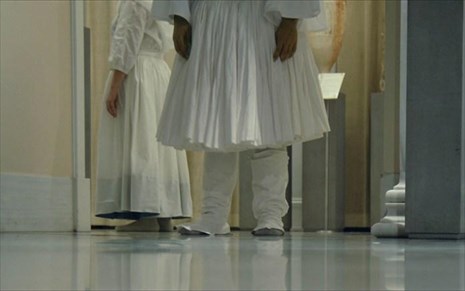The creatures ruling in the night wake up due to their thirst for blood but also to tell their story, to provide a convincing answer to the question of "Have there ever been werewolves in Greece?" In the Constantinos Delas’ play "Greek werewolf," the Boulouki theatre troupe reveals a dark and metaphysical tradition through the eyes of Greek legends.
Its aim is to provide the public with the opportunity to get a clearer idea of these mysterious creatures called "vrykolakas" or "vorvolakas" that are afraid of seawater even more than of the sun.
The play is a journey to the medieval and more recent Greek literature. The viewers will "see" the strange creatures through the eyes of foreign travellers, ethnographers, poets and the testimonies of ordinary people presented in local newspapers or simply kept as legends.

The performances start today and will continue until 16 April and there will be only eight of them at the Benaki Museum, every Monday and Tuesday at 9 pm.
Its exhibits will "come to life" to tell their and other people’s stories. Three actors, with the music of speech and movement, turn the narration into theatrical texts, giving answers to some questions at the same time: Who is Aristotle Valaoritis’ "Werewolf"? What did the foreign travellers see on the Greek islands during the time before the War of Independence in 1821? What lies behind the legends of recent times? Who is the dead brother in the folk tales?
According to the Greek myths, werewolves are the bodies of dead people, who leave their graves at night for various reasons. They can take the shape primarily of domestic animals to scare their living relatives or strangers, occupying the premises, to which they go. Thus, the popular mind associates them with evil and Satan. In some regions, people call them "katahanades" or "timbanei" because they are swollen with the human blood they drink.

Werewolves also eat flour or milk; they profane the houses of their relatives and usually kill them first. They are not afraid of sunlight but are afraid of the things of God, and according to some legends, they return to their graves only on Saturday or Sunday. What scares them is water, especially seawater, which they cannot cross.
The topic attracts the interest of contemporary anthropologists who try to separate legend from reality and to explain why the legends of the "undying" are so widespread despite the lack of evidence of their existence so far.
The beliefs associated with werewolves inspired great poets from different countries and anonymous folk artists. Goethe wrote the ballad "Erl Kenya" which has been translated into Greek. "Werewolves" is the title of one of Ibsen’s dramatic works.
In Greek poetry, Aristotle Valaoritis skilfully develops the werewolf theme in his poem "Thanasis Vaias".
Argyris Efthaliotis is the author of the tragedy of country life "Werewolf." In his drama "Oath of the dead," Zaharias Papantoniou borrowed the storyline from the famous folk song "Konstandis" whose main character becomes a werewolf to bring his sister back from foreign lands to their mother, as he had promised while he was alive.
Additional information about the play is available in the main building of Benaki Museum (1 Koumbare and Vassilis Sofias, Athens), tel.: 210 3671000. Ticket price: 10 euro.